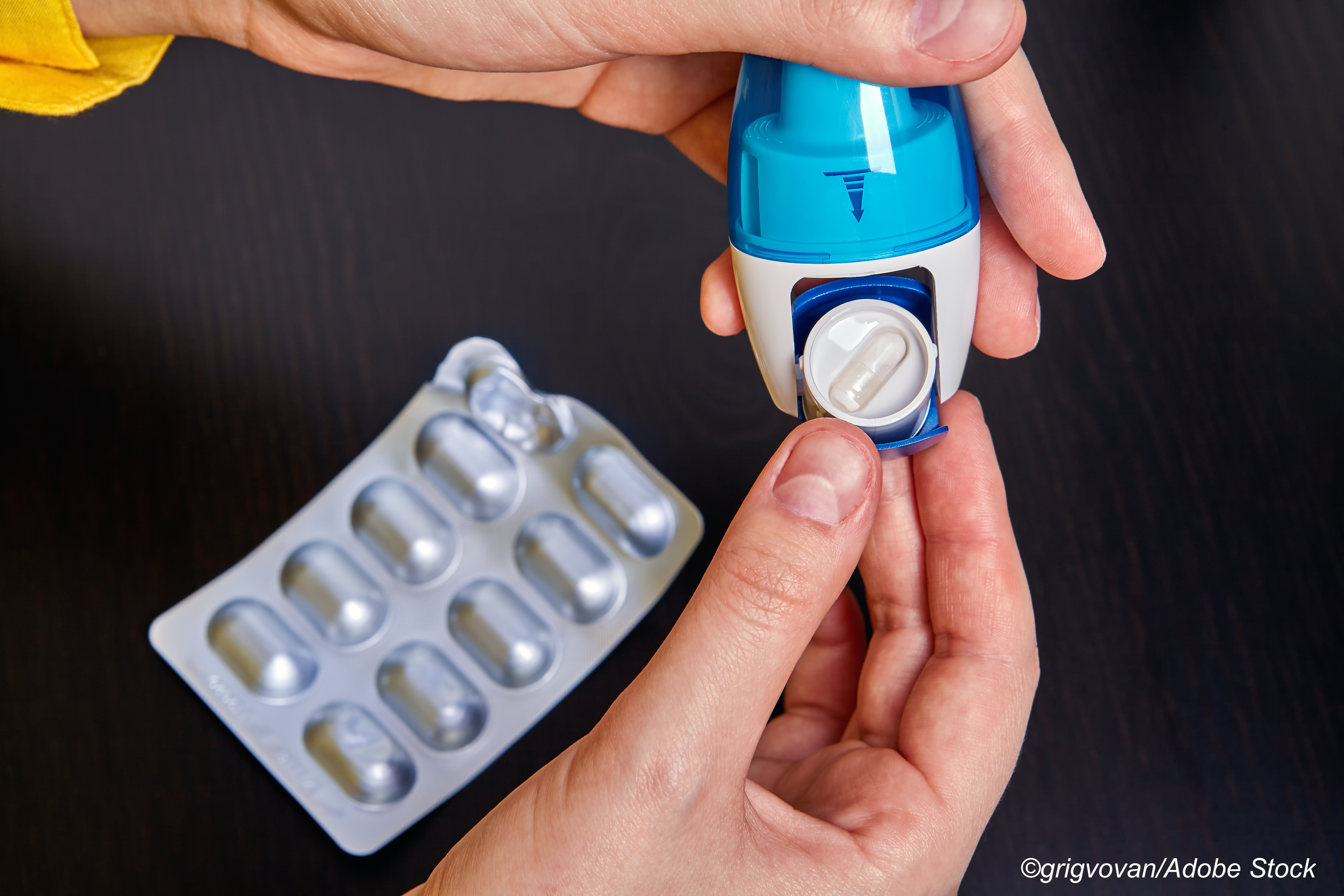
Early treatment with the inhaled corticosteroid budesonide appeared to shorten time to recovery by close to 3 days for non-hospitalized Covid-19 patients at high risk for complications in the multicenter, open-label, multi-arm PRINCIPLE randomized trial.
The study also found treatment with the inhaled corticosteroid to have a high probability of reducing hospital admissions and death from Covid-19, but the absolute difference of 2% compared to usual care did not meet the prespecified superiority threshold.
“PRINCIPLE is the first randomized trial to demonstrate effectiveness of inhaled budesonide to treat Covid-19 in the community and builds on earlier evidence from the phase II STOIC trial,” wrote researcher Christopher C. Butler, FMedSci, of the University of Oxford, United Kingdom, and colleagues in The Lancet.
The smaller, open-label STOIC trial was the first randomized study to suggest that early administration of inhaled budesonide can reduce the progression to severe Covid-19 and hasten recovery time. Clinical recovery was reported to be one day shorter in the patients treated with the oral corticosteroid compared to usual care, and fewer had persistent symptoms at days 14 and 28.
Like STOIC, PRINCIPLE included patients who were not hospitalized, but the latter trial excluded younger adults without comorbidities.
Eligible participants were age 65 years or older or 50 years or older with comorbidities with symptoms consistent with Covid-19 for up to 14 days without hospital admission.
The Covid-19 interventions assessed in the trial include hydroxychloroquine, azithromycin, doxycycline, colchicine, favipiravir, and budesonide.
Participants in the budesonide study were randomly assigned to usual care, usual care plus inhaled budesonide (800 μg twice daily for 14 days), or usual care plus other interventions, and they were followed up for 28 days.
All study participants were aware of their group assignment and the co-primary study endpoints were time to first self-reported recovery and hospital admission or death related to Covid-19, within 28 days, analyzed using Bayesian models.
The trial began enrolling patients in early April 2020, with randomization to budesonide occurring from late November 2020 through March of this year, when the prespecified time to recovery superiority criterion was met.
In all, 4,700 participants were randomly assigned to treatment with either budesonide (n=1,073), usual care alone (n=1,988), or other treatments (n=1,639).
The primary analysis model included 2,530 SARS-CoV-2-positive participants, with 787 in the budesonide group, 1,069 in the usual care group, and 974 receiving other treatments.
Among the main findings:
- Self-reported recovery was shorter in the budesonide group by an estimated 2.94 days (95% Bayesian credible interval [BCI] 1.19-5.12) in the budesonide group versus the usual care group (11.8 days [95% BCI 10.0-14.1] versus 14.7 days [12.3-18.0]; hazard ratio 1.21 [95% BCI 1.08-1.36]), with a probability of superiority greater than 0.999, meeting the prespecified superiority threshold of 0.99.
- For the hospital admission or death outcome, the estimated rate was 6.8% (95% BCI 4.1-10.2) in the budesonide group versus 8.8% (5.5-12.7) in the usual care group (estimated absolute difference 2.0% [95% BCI –0.2 to 4.5]; odds ratio 0.75 [95% BCI 0.55-1.03]), with a probability of superiority 0.963, below the prespecified superiority threshold of 0.975.
- Two participants in the budesonide group and four in the usual care group had serious adverse events (hospital admissions unrelated to Covid-19).
In an editorial published with the budesonide findings, Dee Mangin, MD, of McMaster University, Ontario, Canada, and Michelle Howard of the University of Otago, Christchurch, New Zealand, wrote that while there are plausible mechanisms to explain why inhaled corticosteroids may be useful in the treatment of Covid-19, there is also reason for caution.
They noted that in the widely reported RECOVERY trial, oral steroids were found to benefit patients with severe disease, but they showed no benefit and possible harms in Covid-19 patients with less serious illness. In addition, several studies in patients with COPD and asthma showed worse Covid-19 outcomes in those on inhaled corticosteroids.
“On the basis of the PRINCIPLE trial data, it seems reasonable to consider inhaled corticosteroid use in early Covid-19 patients similar to the trial population group (people with ongoing symptoms from Covid-19 aged ≥65 years or ≥50 years with specific comorbidities) who are interested in using them,” they wrote. “…These trial data do not support use in younger populations who are at lower risk of complications (<65 years with no comorbidities or anyone <50 years).
“Because vaccination was uncommon in trial participants, an important question is whether and what effect would be seen in the fully vaccinated population who have a different illness severity and trajectory,” they added.
-
Early treatment with the inhaled corticosteroid budesonide appeared to shorten time to recovery by close to 3 days in non-hospitalized Covid-19 patients at high risk for complications in the multicenter, open-label, multi-arm PRINCIPLE randomized trial.
-
The study also found treatment with the inhaled corticosteroid to have a high probability of reducing hospital admissions and death from Covid-19, but the absolute difference of 2% compared to usual care did not meet the prespecified superiority threshold.
Salynn Boyles, Contributing Writer, BreakingMED™
This research was funded by the National Institute of Health Research and United Kingdom Research Innovation.
Researcher Mona Bafadhel reports grants from AstraZeneca, personal fees from AstraZeneca, Chiesi, and GlaxoSmithKline; and is a member of advisory boards for Albus Health and ProAxsis, outside the submitted work. Researcher Duncan Richards reports being a former employee of GlaxoSmithKline, outside the submittedwork. Other researchers also reported industry relationships outside the submitted work.
The editorial writers’ declared no competing interests.
Cat ID: 190
Topic ID: 79,190,282,494,931,730,933,190,926,255,927,151,928,195,929,925,934


